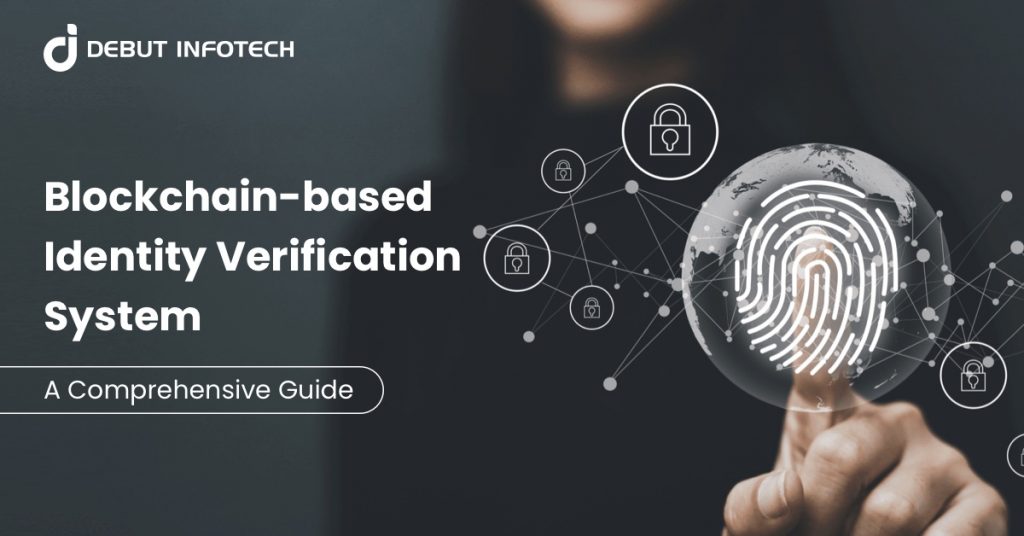
Managing and protecting your identity is essential in today’s digital world, where several identities are scattered over a disjointed landscape of websites, databases, and applications. This results in inefficiencies and access hurdles, in addition to bringing up privacy and security concerns. Millions of people find it challenging to participate in even the most basic life activities, such as voting, getting healthcare, or opening a bank account, because they lack a safe, verifiable identity.
This is where Blockchain comes into play. Through a distributed trust paradigm, a blockchain-based Identity verification system provides a reliable solution that returns control to users. Read on to see how individuals can control access to their identity and manage their data with blockchain data privacy features. But first, we start with the challenges the current traditional identity management system faces.
Challenges Faced by the Traditional Identity Management System
The current identity management system has loopholes that can expose users to several risks. At every point, you are asked to verify your identity with government IDs like passports, voter IDs, and other means of identification available in your location. These blockchain and identity verification details are often shared with third parties or stored at a location unknown to the user. Some significant challenges faced by the traditional identity management system are:
- Lack of control
- Identity theft
- KYC
- Username and password combinations
Lack of control
Currently, users cannot control personally identifiable information (PII). They are unaware of how often their personal information has been saved and disseminated without their consent.
Identity Theft
Individuals divulge personal information online through many unidentified sources or services, which may allow their identity documents to fall into the wrong hands. Furthermore, since internet apps save their data on centralized servers, it becomes easy for hackers to breach those systems and steal confidential data. According to a data report for The Breach Level Index, about 4,861,553 records are stolen daily, including an hourly total of 202,565 records, 3,376 records each minute, and 56 records per second.
The statistics on breaches show how rapidly a hacker can obtain private or sensitive data.
KYC Verification
Know-Your-Customer, popularly called KYC, is another means that individuals can lose their data in the hands of criminals. Currently, three parties are involved in the authentication process.
- Users
- Verifying businesses/KYC businesses
- Third parties must confirm the user’s identity
For each of these parties involved, there are costs to pay. KYC organizations need additional resources to promptly handle the requests of various institutions, including banks, healthcare providers, immigration officials, and others. As a result, KYC businesses are forced to increase their verification fees, which are passed along to individuals through unstated processing costs. In addition, it takes a while for outside companies to onboard new clients.
Users also pay to have their details leaked to data beaches. Hackers and identity thieves can hijack users’ data during a KYC process, putting the unsuspecting user at risk compared to using blockchain for identity verification.
According to a global survey on “Know Your Customer” issues, the anticipated yearly global spending on KYC is $48 million.
Username and Passwords Combination
Every time a person registers on a new website, they must generate a unique username and password. A person finds it challenging to recall a variety of usernames and passwords to access various services. It can be difficult to keep many authentication accounts up to date.
Solutions provided by blockchain identity management systems

The blockchain offers an innovative solution to the challenges of the current identity management system through blockchain development companies like Debut Infotech. Identity verification on blockchain enables people to take control of their identity by generating a global ID that can be used for various functions.
With blockchain technology, no third party can share users’ personal information without permission. Using the blockchain for identity verification guarantees that
- individual identities can be protected from data breaches and identity thieves.
- Individuals do not need to create and remember multiple usernames and passwords across several services.
- Users can create encrypted digital identities.
Now, let us understand how the blockchain identity verification system works.
Blockchain Identity System: Understanding the Technical Components
To understand how a blockchain-based identity verification system works, it is imperative first to understand the technicalities of the process. Five criteria must be met before implementing blockchain identity management.
- Application for users
- Application for KYC companies/ third-party companies
- Interplanetary system for storing users’ personally identifiable information (PII).
- Node Js programmed microservices
- Permissioned blockchain tool.
With the above tools in place, individuals’ data can be protected and can only be accessed with permission from the owner.
Steps involved in the Blockchain Identification process
People now require a more proper way of managing their identification than paper documents. The Blockchain Identity Management app will allow users to verify and validate their identities in real-time.
Step 1. Install the app
A person must first download the mobile app from the App or Play Store to verify their identity. After installation, the user will register for an account on the app.
Once a profile has been created, the user will receive a unique ID number, enabling companies to access their identity documents.
Step 2. Upload the identification documents.
Following the user’s ID number assignment, they must submit official government identification documents to the app, which will be saved in the IPFS using hashed addresses kept on the blockchain.
The software will extract the user’s personal data from these IDs to self-certify their details. The data will belong to the user. It assists users in selecting which information to disclose to organizations. More importantly, no data can be shared without the owner’s consent.
Step 3. Smart contract trust score generation
Using the data that users submit, smart contracts with business logic can create a self-sovereign identity and utilize that information to calculate a user’s trust score.
Step 4. Access requests by third-party companies
A notification will be sent to the identity holders whenever a corporation needs access to specific personal information for authentication purposes.
Third parties may utilize the identifying information to verify an individual’s identity if the user grants permission for the companies to access their personal data. Additionally, people can track the intent behind using their PII.
The user’s data or information is not stored on the blockchain. Instead, only the blockchain will record transactions between identity holders and businesses.
To explain better, let’s consider the example of Jane, who wants to study overseas. Let’s say Jane has to verify her identity to apply to study abroad programs. The blockchain-enabled identity management program allows the education facility to verify her identity swiftly.
The center will be able to submit the request for information access once Jane gives them the unique ID number. Once she verifies the request, the transaction will be registered on the blockchain, and the education hub can examine her documents. It is important to note that the Personally Identifiable Information will be stored in an encrypted form on the phone.
Explaining Trust Scores and How It Helps Blockchain Verification
As mentioned earlier, smart contracts can use blockchain identity management to initiate business rules and produce a trust score for each participant. Smart Contracts’ trust score can assist enterprises in instantly verifying the identity of users. Uploading several documents to the app and using it frequently will increase a user’s trust score. A user’s account can be examined to see whether it is legitimate or suspicious based on their trust score.
For the first six months following their registration, a user may be regarded as a novice, allowing them the opportunity to build their trust score. They will need to upload the necessary data within that time.
Factors to Increase a Trust Score
- Document uploading: The trust score will increase with the number of identity documents a user uploads. It is what beginners need most to begin building their scores.
- Corresponding Data: The system checks if fields like name, birthdate, and so on are consistent throughout the submitted papers. The trust score will increase with more positive matches.
- Frequent use: Users may need to utilize the system frequently to maintain and enhance their trust score.
Factors That Can Reduce a Trust Score
- Failure to upload necessary documents.
- Frequent changes made to the personal information provided by the user can lead to the system reading the user for suspicious activity and, thus, reducing the trust score.
- Continuously rejecting identity verification from specific organizations.
Use Cases of the Blockchain Identity Verification System
Load application: By rapidly sharing pertinent information, blockchain-based identity can speed up bank account openings and loan applications. It can also cut down on the time and expense of manual verification by eliminating the need for numerous IDs.
Legal cases: Thanks to blockchain identity management, legal and government agencies can confirm a person’s identification using just one blockchain-based identity.
Immigration: To shorten the process and eliminate the need for complicated procedures, travelers can submit a universal blockchain-based identification to authorities during airport clearance and security checks.
Employment verification: Although there isn’t a standard for background checks in the global job industry, user consent allows the blockchain ecosystem to verify employee information.
Checking out of E-commerce sites: Utilizing distinct identification numbers for several e-commerce sites might streamline the laborious and time-consuming online order registration procedures that users frequently encounter.
Benefits of Blockchain Identity Verification System

Unique ID: Blockchain identity verification systems give users unique ID numbers and encrypted personal data saved on devices, which they can exchange with other parties for verification.
Consent: With smart contracts, blockchain identity verification solutions ensure user consent for transactions, prevent data manipulation, and give users control over their personally identifiable information.
Universal Ecosystem: By removing geographical restrictions, blockchain identity management enables users to authenticate themselves internationally.
Decentralization: The technology stores user identity papers on devices via decentralized identity verification, supported by IPFS. This eliminates the possibility of single points of failure (SPOF) and prevents large-scale data breaches.
Conclusion
Blockchain identity verification improves security and privacy by giving third parties access to an immutable, decentralized ledger to verify user information. This technique does away with the requirement for centralized sources, lowering the risk of fraud and identity theft. Users can easily track unlawful access and maintain control over their data thanks to the transparency and traceability of Blockchain transactions. To fully gain Identity control in your enterprise, contact the professionals at Debut Infotech, who will get you started on all the steps you need to take. All things considered, Blockchain identity management provides a safe, effective method of handling and safeguarding private user data.
FAQs
Blockchain Identity Management is a decentralized system that enables individuals to have control over their digital identities using blockchain technology. It allows users to manage and verify their personal information securely.
Blockchain Identity Management works by storing identity-related data on a blockchain, ensuring that it remains tamper-proof and accessible only to authorized users. Users can grant or revoke access to their data as needed.
Blockchain Identity Management is essential because it enhances security and privacy. It reduces the risk of identity theft, minimizes reliance on central authorities, and gives individuals more control over their personal information.
Yes, Blockchain Identity Management can be used for online authentication. It offers a secure and efficient way to verify identities for various online services and transactions.
Blockchain Identity Management can be integrated with existing identity systems, making it adaptable to different use cases and industries.
Smart contracts in blockchain identity systems automate identity verification processes, allowing for seamless and trustless interactions between parties.
Yes, blockchain protects user identities through cryptographic encryption and pseudonymous addresses, ensuring transactions do not directly reveal personal information. However, public blockchains record all transactions transparently, making it possible to trace activity if an address is linked to a real identity. Privacy-focused solutions like zero-knowledge proofs (ZKPs) and privacy coins enhance anonymity.
To protect blockchain-based identities, individuals should secure their private keys, use strong passwords, enable multi-factor authentication, and be cautious when sharing personal information.
Challenges include scalability, interoperability, regulatory compliance, and the potential for loss of access if private keys are lost.
While it is gaining traction, widespread adoption of Blockchain Identity Management is still in progress, with various initiatives and projects in different industries and regions.
Yes, governments and businesses can benefit from improved security, reduced fraud, and streamlined identity verification processes by adopting Blockchain Identity Management solutions.
Getting started with Blockchain Identity Management may involve using existing blockchain platforms, joining blockchain identity projects, or seeking the services of blockchain identity providers.


